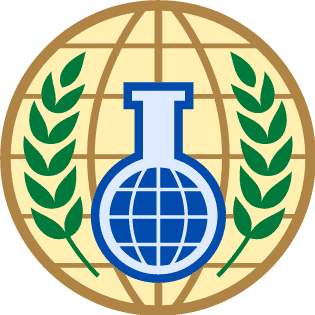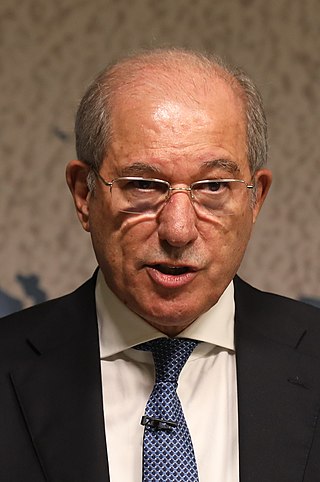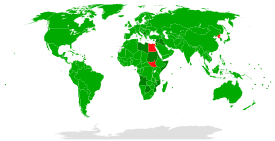
The Organisation for the Prohibition of Chemical Weapons (OPCW) is an intergovernmental organisation and the implementing body for the Chemical Weapons Convention (CWC), which entered into force on 29 April 1997. The OPCW, with its 193 member states, has its seat in The Hague, Netherlands; it oversees the global endeavour for the permanent and verifiable elimination of chemical weapons.

The Chemical Weapons Convention (CWC), officially the Convention on the Prohibition of the Development, Production, Stockpiling and Use of Chemical Weapons and on their Destruction, is an arms control treaty administered by the Organisation for the Prohibition of Chemical Weapons (OPCW), an intergovernmental organization based in The Hague, The Netherlands. The treaty entered into force on 29 April 1997. It prohibits the use of chemical weapons, and also prohibits large-scale development, production, stockpiling, or transfer of chemical weapons or their precursors, except for very limited purposes. The main obligation of member states under the convention is to effect this prohibition, as well as the destruction of all current chemical weapons. All destruction activities must take place under OPCW verification.

José Maurício de Figueiredo Bustani is a Brazilian diplomat who was the first director-general of the Organisation for the Prohibition of Chemical Weapons until he was ousted after pressure from the US government in April 2002 over disagreements about how to address Iraq's alleged weapons of mass destruction.

Many nations continue to research and/or stockpile chemical weapon agents despite numerous efforts to reduce or eliminate them. Most states have joined the Chemical Weapons Convention (CWC), which required the destruction of all chemical weapons by 2012. Twelve nations have declared chemical weapons production facilities and six nations have declared stockpiles of chemical weapons. All of the declared production facilities have been destroyed or converted for civilian use after the treaty went into force.

The International Campaign to Abolish Nuclear Weapons is a global civil society coalition working to promote adherence to and full implementation of the Treaty on the Prohibition of Nuclear Weapons. The campaign helped bring about this treaty. ICAN was launched in 2007. In 2022, it counted 661 partner organizations in 110 countries.

Ahmet Üzümcü is a Turkish career diplomat, who previously served as the Director-General of the Organisation for the Prohibition of Chemical Weapons (OPCW).

The United States Permanent Representative to the Organization for the Prohibition of Chemical Weapons (OPCW) has the rank of Ambassador and is based in The Hague, Netherlands, the seat of the OPCW. The current permanent representative is Nicole Shampaine.

Dominique Hoppe is the current president of the Assemblée des francophones fonctionnaires des organisations internationales (AFFOI).

The Spiez Laboratory is the Swiss institute for the protection of the population against nuclear, biological and chemical threats and dangers. It is part of the Federal Department of Defence, Civil Protection and Sports (DDPS) and is located in Spiez. The Spiez Laboratory is one of the five labs in the world permanently certified by the Organisation for the Prohibition of Chemical Weapons.

The destruction of Syria's chemical weapons began on 14 September 2013 after Syria entered into several international agreements which called for the elimination of Syria's chemical weapon stockpiles and set a destruction deadline of 30 June 2014. Also on 14 September 2013, Syria acceded to the Chemical Weapons Convention (CWC) and agreed to its provisional application pending its entry into force on 14 October. Having acceded to the CWC, the Organisation for the Prohibition of Chemical Weapons (OPCW) Executive Council on 27 September approved a detailed implementation plan that required Syria to assume responsibility for and follow a timeline for the destruction of Syrian chemical weapons and Syrian chemical weapon production facilities. Following the signing of the Framework Agreement on 14 September 2013 and after the OPCW implementation plan, on 27 September the United Nations Security Council unanimously adopted Resolution 2118 which bound Syria to the timetable set out in the OPCW implementation plan. The joint OPCW-UN mission was established to oversee the implementation of the destruction program.

United Nations Security Council Resolution 2118 was adopted unanimously on 27 September 2013, in regard to the Framework for Elimination of Syrian Chemical Weapons during the Syrian civil war. It recalled United Nations Security Council Resolutions 1540, 2042 and 2043 and occurred on the sidelines of the General debate of the sixty-eighth session of the United Nations General Assembly. Under the Resolution, Syria had until mid-2014 to destroy its chemical weapons arsenal; and the Resolution also outlines plans for a transition. Despite a few hiccups, the OPCW reported that the destruction was largely on schedule.

The Day of Remembrance for All Victims of Chemical Warfare is an annual event held November 30 as a "tribute to the victims of chemical warfare, as well as to reaffirm the commitment of the Organisation for the Prohibition of Chemical Weapons (OPCW) to the elimination of the threat of chemical weapons, thereby promoting the goals of peace, security, and multilateralism." It is officially recognised by the United Nations (UN) and has been celebrated since 2005. On the 2013 observance day, the UN Secretary-General Ban Ki-moon gave a speech where he stated:
On this Remembrance Day, I urge the international community to intensify efforts to rid the world of chemical weapons, along with all other weapons of mass destruction. Let us work together to bring all States under the Convention and promote its full implementation. This is how we can best honour past victims and liberate future generations from the threat of chemical weapons.
The OPCW-UN Joint Mission in Syria was jointly established on 16 October 2013 by the Organisation for the Prohibition of Chemical Weapons (OPCW) and the United Nations (UN) to oversee the elimination of the Syrian chemical weapons program. The Joint Mission continued the work of the OPCW-UN advance team that had arrived in Damascus on 1 October 2013.
The OPCW Fact-Finding Mission in Syria is a mission of the Organisation for the Prohibition of Chemical Weapons (OPCW) to investigate some possible cases of the use of toxic chemicals in Syria during the civil war, including chlorine. The 21 August 2013 Ghouta chemical attack used sarin. The OPCW-Director General Ahmet Üzümcü announced the creation of the mission on 29 April 2014. This initial mission was headed by Malik Ellahi. The Syrian Government agreed to the Mission.
Ahmad Zangiabadi was an Iranian veteran. He undertook the control and defense of Arvand Rud during the Iran-Iraq war. He was injured in the Tala'ie region of Majnoon Island by sulfur mustard from chemical bombing by Iraqi forces.
The OPCW–The Hague Award is an annual award founded by the OPCW as a result of their being presented with the 2013 Nobel Peace Prize. The purpose of the Award is to honour and recognize individuals and institutions that have significantly contributed towards the goal of a world free of chemical weapons.

On 7 April 2018, a chemical warfare attack was launched by the forces of the government of Bashar al-Assad in the city of Douma, Syria. Medics and witnesses reported that it caused the deaths of between 40 and 50 people and injuries to possibly well over 100. The attack was attributed to the Syrian Army by rebel forces in Douma, and by the United States, British, and French governments. A two-year long investigation by the Organisation for the Prohibition of Chemical Weapons (OPCW) Investigation and Identification Team (IIT) concluded in January 2023 that the Syrian Air Force perpetrated the chemical attacks during its military campaign in Douma. On 14 April 2018, the United States, France and the United Kingdom carried out a series of military strikes against multiple government sites in Syria.

Franz Gamboa Ontal is a Filipino anti-nuclear activist known for his role as head of inspector training at the Organisation for the Prohibition of Chemical Weapons (OPCW).

















